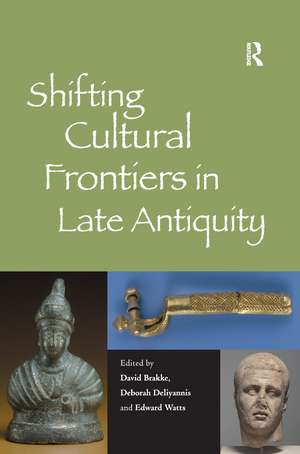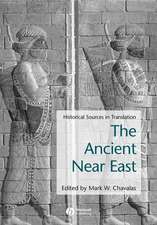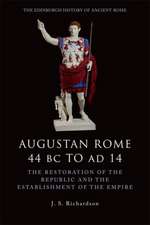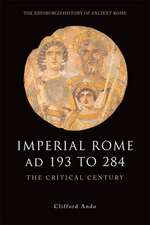Shifting Cultural Frontiers in Late Antiquity
Autor David Brakke, Deborah Deliyannisen Limba Engleză Paperback – 28 oct 2016
| Toate formatele și edițiile | Preț | Express |
|---|---|---|
| Paperback (1) | 488.12 lei 6-8 săpt. | |
| Taylor & Francis – 28 oct 2016 | 488.12 lei 6-8 săpt. | |
| Hardback (1) | 1117.88 lei 6-8 săpt. | |
| Taylor & Francis – 28 iun 2012 | 1117.88 lei 6-8 săpt. |
Preț: 488.12 lei
Nou
Puncte Express: 732
Preț estimativ în valută:
93.40€ • 97.72$ • 77.59£
93.40€ • 97.72$ • 77.59£
Carte tipărită la comandă
Livrare economică 02-16 aprilie
Preluare comenzi: 021 569.72.76
Specificații
ISBN-13: 9781138275188
ISBN-10: 1138275182
Pagini: 304
Dimensiuni: 156 x 234 mm
Greutate: 0.43 kg
Ediția:1
Editura: Taylor & Francis
Colecția Routledge
Locul publicării:Oxford, United Kingdom
ISBN-10: 1138275182
Pagini: 304
Dimensiuni: 156 x 234 mm
Greutate: 0.43 kg
Ediția:1
Editura: Taylor & Francis
Colecția Routledge
Locul publicării:Oxford, United Kingdom
Cuprins
Contents: Introduction, David Brakke; Part I Shared Intellectual Space: 'It is not the custom of our Syriac language...': reconsidering the role of translation in the Polemics of Philoxenos of Mabbug, David A. Michelson; Negotiations with death: Ephrem's control of death in dialogue, Ellen Muehlberger; Nature, law and human freedom in Bardasian's Book of the Laws of the Countries, Kathleen Gibbons; Earth people in Rabbinic and Roman discourse, Anne Kreps. Part II High and Low Cultural Negotiation: Where high and low culture meets: the legend of the Cross, Harold Drake; Curiositas nihil recusat: a playful defense of 'low' biography against 'high' history, Cristiana Sogno; Decline of political culture: Ammianus Marcellinus' characterization of the reigns of Valentinian and Valens, Jan Willem Drijvers; 'How then is it not better to prefer quiet, than the dangers of conflict?': the imperial court as the site of shifting cultural frontiers, Charles F. Pazdernik. Part III Literary Culture: Augustine, the Donatists and the litterae pacifica, Jennifer Ebbeler; On the poetics of Dioscoros of Aphrodito: the encomium on Duke Kallinikos (P. Cair. Masp. III 67315), Raymond L. Capra; Late Antique visuality: blurring the boundaries between word and image, pagan and Christian, James A. Francis; The ant of God: Augustine, scripture, and cultural frontiers, Gillian Clark. Part IV Material and Popular Culture: Shining a light on shifting frontiers: cultural uses of ceramic lamps during late Antiquity, Kate da Costa; Sleeping arrangements and private space: a cultural approach to the subdivision of late Antique homes, Leslie Dossey; 'Blushing in such company?' The social status of athletes in late Antiquity, Sofie Remijsen; Viewing the column of Arcadius at Constantinople, John Matthews; Late Antique fora and public honor in the Western cities: case studies, Jinyu Liu. Part V Negotiating the Imperial Frontier: Rebaptism as a ritual of cultural integration in Vandal Africa, Eric Fourni
Notă biografică
David Brakke is Professor of Religious Studies, Adjunct Professor of Classical Studies and History, and Chair of the Department of Religious Studies at Indiana University, USA; Deborah M. Deliyannis is Assistant Professor of History and Adjunct Assistant Professor of the History of Art at Indiana University, Bloomington, USA. Edward Watts is Associate Professor of History and Adjunct Associate Professor of Religious Studies and Classical Studies at Indiana University, Bloomington, USA.
Recenzii
'... the twenty chapters bear witness to the complexity and richness of late-antique societies and the many possible avenues for their interpretation.' Bryn Mawr Classical Review 'The editors have produced a very fine resource with this volume. It covers many thematic and geographical aspects of late-antique culture, which makes for a pleasing variety...' Classical Review
Descriere
Shifting Cultural Frontiers in Late Antiquity explores the transformation of classical culture in late antiquity by studying cultures at the borders - of empires, of social classes, of public and private spaces, of literary genres, of linguistic communities, and of the modern disciplines that study antiquity. Although canonical figures of late ancient studies appear in its pages, by looking away from the core and toward the periphery, whether spatially or intellectually, the volume offers fresh insights into how ancient patterns of thinking and creating became reconfigured into the diverse cultures of the 'medieval.'
















